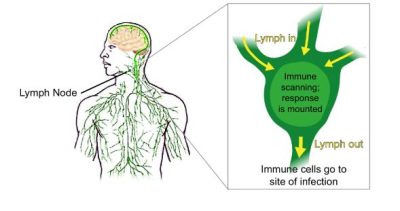The lymphatic and the immune systems are closely interconnected. Together they protect the body from infections and maintain overall health. The lymphatic system is a network of vessels, nodes, and organs including the spleen which is the largest secondary lymphoid organ and has a wide range of immunological functions. Lymph, a clear fluid rich in immune cells like T cells and B cells, flows through the lymphatic system to transport these white blood cells throughout the body. Their mission is to detect and combat invaders such as bacteria, viruses, and abnormal cells.
Lymph nodes are small, bean-shaped structures found throughout the lymphatic system. They serve as filtering stations for lymph. Immune cells are concentrated in the lymph nodes, where they can encounter and respond to antigens (foreign substances) present in the lymph fluid. When the immune system detects an antigen, it triggers an immune response.
The activation of the immune response, known as Immune Response Activation in Lymph nodes (I.R.A.L.), is crucial. The nodes have a pivotal role in starting and organizing immune reactions. When antigens are identified in the lymph, the immune cells within the lymph nodes spring into action. This activation triggers the creation of antibodies and calls upon other immune cells to launch a specific, targeted immune defense.
IMMUNE MEMORY
The lymphatic system also plays a role in immune memory. After the immune system successfully fights off an infection, memory cells are formed, and these cells are stored in lymph nodes. This allows the immune system to respond more rapidly and effectively if the same pathogen invades the body in the future. This immunological memory is a crucial component of the body’s defense mechanisms and ensures a quicker, more efficient response to a recurring threat.

Photo Credit: University of Virginia Health System
REMOVAL OF WASTE & TOXINS
The lymphatic system helps remove waste products, toxins, and cellular debris from tissues, which indirectly supports the immune system by maintaining a clean and healthy environment within the body. The viscosity of the lymph fluid is telling in its ability to gather up and move out the debris and keep the system clean. When the lymphatic system becomes overwhelmed the viscosity of the lymph becomes thickened and therefore loses its ability to move and clear out the waste. Keeping the lymphatic fluid less “jello-like” and more fluid-like allows for proper flow and function of the immune system as it enables immune cells to get to the sites of infections or antigen-evasion quicker.
CIRCULATION OF LYMPHOCYTES
Lymphocytes are a type of white blood cell that play a central role in the immune response. They circulate through the lymphatic system, blood, and lymphoid organs, which enables them to monitor the entire body for potential threats. The lymph system is always working and on alert and will signal the body to respond to both internal waste and external threats.
In summary, the lymphatic system provides a transportation and filtration system for immune cells and plays a crucial role in immune surveillance, response, and memory. It is an integral part of the immune system, working together to protect the body from infections and maintain overall health. Swollen lymph nodes are indications of infection somewhere in the body. When our lymph system is overwhelmed our immune system is unable to appropriately respond and keep the body protected. When the lymphatics are burdened beyond its ability the toxic loads and cellular waste is circulated through the system without an exit.
Keeping our lymphatic system in good working order is vital to the proper function of our immune system. In fact, the immune system greatly depends on the proper movement and flow of the lymphatics. Without good lymphatic flow and proper viscosity our immune system will never be able to support proper healthy function as well as good immune response. Some ways to support your lymphatic system include Manual Lymphatic Pumping, FlowPresso sessions, rebounding, vibration plates, or the FlowVibe device.

